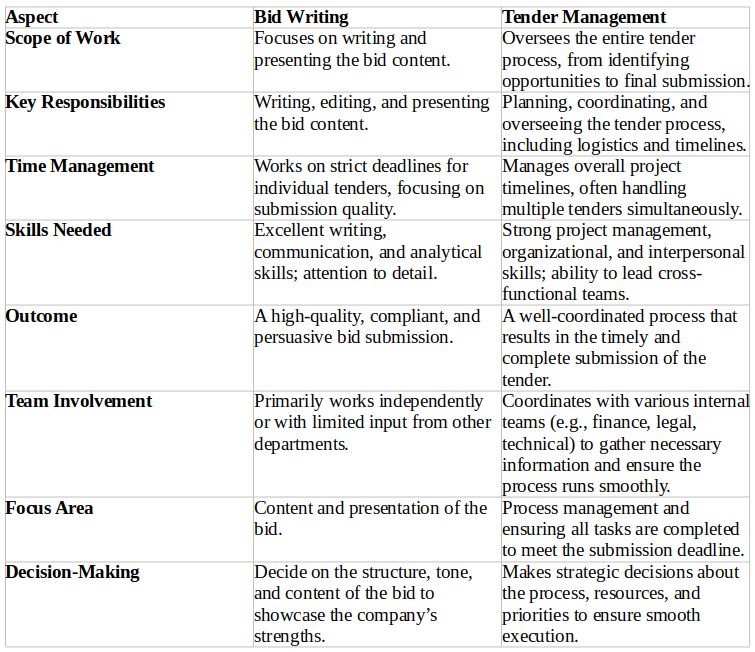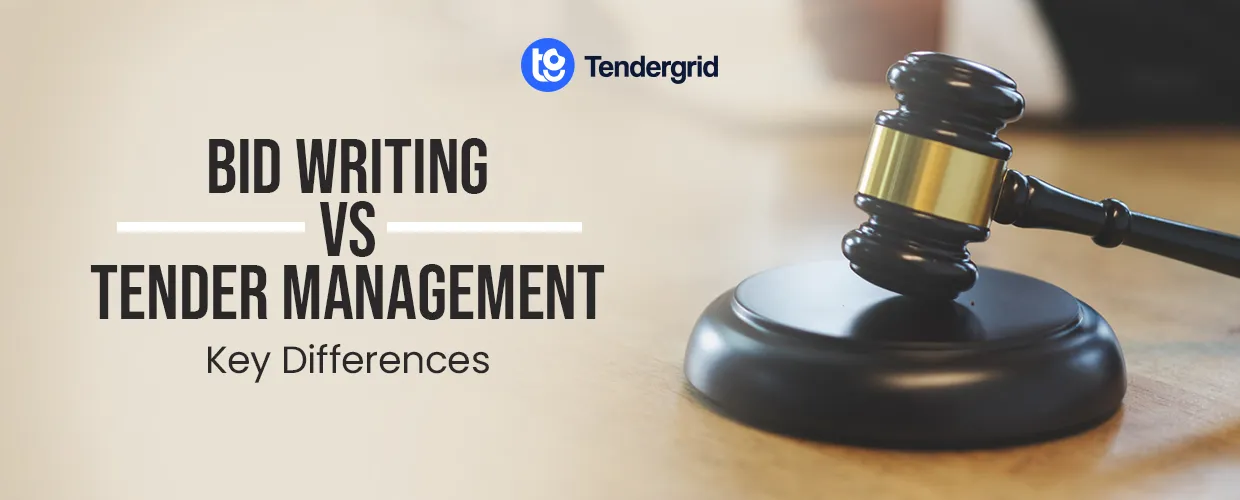In today's competitive business environment, winning big tenders, in the public or private sector, often needs a well-structured approach to tendering.
Many organizations believe it boils down to two crucial processes: Bid Writing and Tender Management. These two processes serve different purposes and require different skill sets. Winning tenders becomes easier once one understands Bid Writing and Tender Management.
In this blog we will discuss what Bid Writing and Tender Management entail, the key differences between the two, and how a tender management portal like Tender Grid can help streamline both processes. This blog is going to help you become clear on how to better navigate the tendering process.
What is Bid Writing?
Writing a good bid is developing a convincing proposal for a tender opportunity, in a private or public sector contract. A good bid submission requires more than just filling out forms and providing basic information. It is a crafted document that shows how the company can meet the customer's needs, solve problems, and deliver value.
This process would typically follow from a request for tender (RFT), request for proposal (RFP), or other tendering documents, in which specific criteria and requirements are outlined.
Core Responsibilities
The main job of the bid writer is to develop clear, concise, compliant proposals answering the tender requirements.
1. Response to Tender Requirements: In working with tender documents, the ideas that the proposal aims to reflect must be understood thoroughly for proposals to address every specified requirement. Thus, all questions must be answered, the appropriate documentation should be done, and adherence to all the technical or legal criteria should be ensured.
2. Tailoring the Proposal: Each bid should be tailored according to the client's necessities, demonstrating what capabilities the company will bring and why it is uniquely suited to deliver the project. Customization is important for differentiating oneself from competitors and emphasizing the company's strengths.
3. Preparing the Company's Offer: Along with all this, bid writers are supposed to present the company's offer in a persuasive, competitive, and compliant manner. This will include preparing a robust executive summary, cost breakdowns, approach and methodology, and core key differentiators.
Skills Needed in Bid Writing
Bid writing requires a unique set of skills, which include the following:
1. Excellent Writing and Communication Skills: Write persuasively and professionally. The content must be clear to understand and make it interesting while meeting all technical requirements.
2. Attention to Detail: Bid writers need to review every detail in the bid to ensure it meets the requirements so that nothing would disqualify the proposal.
3. Analytical Thinking: A good writer of a bid can analyze complex tender documents. He or she can interpret the needs of clients and craft a response to meet those needs.
Challenges in Bid Writing
Bid writing can be an extremely demanding job. Some challenges encountered during bid writing include:
1. Time Pressure: Most tenders have time-bound deadlines, which can leave little time for research, drafting, and amendments.
2. Complex Language: Technical language or industry jargon is common in tender documents that require deep knowledge of the subject matter to address.
3. Compliance: It is challenging to ensure that each part of the bid complies with the specifications of the tendering organization, particularly with all the legal, technical, and financial criteria it must meet.
What is Tender Management?
Tender management is a high-level process of managing the tender submission from start to finish. In contrast, bid writing is the core focus on creating the real proposal, tender management entails overseeing all aspects of the process to ensure a smooth flow and proper stakeholder alignment.
Core Responsibilities
A tender manager will manage and coordinate every aspect of the tender process.
1. Identifying Tender Opportunities: They identify tender opportunities that the company should bid for and monitor these opportunities until the relevant tender is available. The company is then notified about the availability of tenders and makes prior preparations.
2. Cross Functional: Tender management is cross-functional, often involving coordination with finance, legal, operations, and sales departments about gathering information, validating data, and ensuring that the company is giving the best solution to clients.
3. Manage deadlines and compliance: The tender managers follow deadlines, check for compliance with demands, and schedule control to ensure all documents are submitted on time and with accuracy.
4. Oversee the performance of the team: The tender manager leads and coordinates the tender team which consists of bid writers, subject matter experts, designers, and other concerned stakeholders.
Skills Needed in Tender Management
A good tender manager must have:
1. Organizational and Project Management Skills: When tender managers are overseeing multiple tasks and dealing with various people and deadlines, the importance of good organizational ability cannot be overemphasized. Each part of the tendering process is therefore essential to being completed on time.
2. Leadership Skills: Good tender managers should manage and coordinate teams, getting everyone around the same purpose, and ensuring that any problem is resolved rapidly.
3. Tendering Knowledge: A good understanding of the tendering process and relevant procurement policies is necessary. Tender managers should be familiar with both local and international procurement regulations, as well as the specific rules set forth by the tender issuer.
Challenges in Tender Management
Managing tendering processes often comes with a lot of common challenges associated with it such as:
1. Balancing Multiple Tenders: Managing several tendering processes at once is challenging; each of them has its deadlines, requirements, and barriers.
2. Ensuring Stakeholder Alignment: Tender managers may often face the challenge of aligning various groups to meet the deadlines and provide the right information because there are so many departments involved.
3. Resource Constraints: There may be staffing or budgetary challenges facing tender managers, especially in organizations dealing with tenders that vary in their complexity.
Key Differences Between Bid Writing and Tender Management

How Tender Grid and Bid Grid Can Help Streamline Both Processes
Tender Grid and Bid Grid are platforms designed to streamline both the tender management and bid writing processes.
Tender Grid: The Tender Management Portal
Tender Grid is a comprehensive management portal that simplifies the entire tendering process in a centralized way. These include:
- Document Management: Centralized versions of tender documents, easy to track, and compliant with regulations
- Team Collaboration: Communication between different departments to stay on track.
- Compliance Monitoring: Guarantees that all submissions are compliant, thereby minimizing the risks of non-compliance.
Bid Grid: Simplify Bid Writing
Bid Grid is a Bid Writing Portal aimed at making the whole process of creating bids easy. The feature includes:
-
Real-Time Collaboration: Multiple stakeholders can work on bids and push their feedback in together
-
Compliance lists: Helps ensure that all requirements of the bid have been met, thus reducing the risk of providing incomplete or noncompliant data.
How They Improve Efficiency?
-
Both platforms automate many manual tasks, allowing teams to focus on strategic aspects of tenders and bids
-
Tender Grid simplifies the management of multiple tenders, ensuring that deadlines are met and processes run smoothly.
-
Bid Grid accelerates bid creation by providing a structured, user-friendly platform for drafting and finalizing proposals.
-
Both tools save the time of administration and ensure submission accuracy by reducing administrative work. Consistency is assured across documents, with an error-free and high-quality proposal that provides quick, effective submission of tenders.
Conclusion
Bid Writing and Tender Management are crucial for the successful tendering procedure, they play a different and integrative role.
While Bid Writing is more attuned to developing clear and comprehensive proposals against the offered tender that can bring out the best features of the company, Tender Management oversees the whole process, ensuring on-time submission and coordination across departments. Understanding the differences between these processes is very critical for organizations seeking to enhance their prospects of winning tenders.
Tender management portals such as Tender Grid simplify these processes through automation, improved collaboration and compliance, and sophisticated platforms.
Ultimately, a well-organized approach to both Bid Writing and Tender Management, backed by effective platforms, can significantly amplify the prospects of an organization amidst the competitive tendering landscape to win golden contracts.


